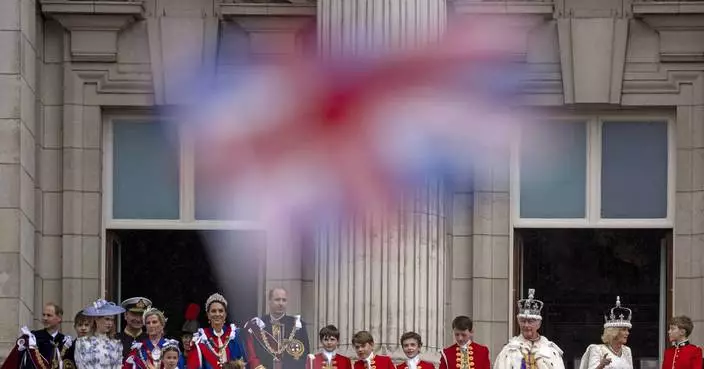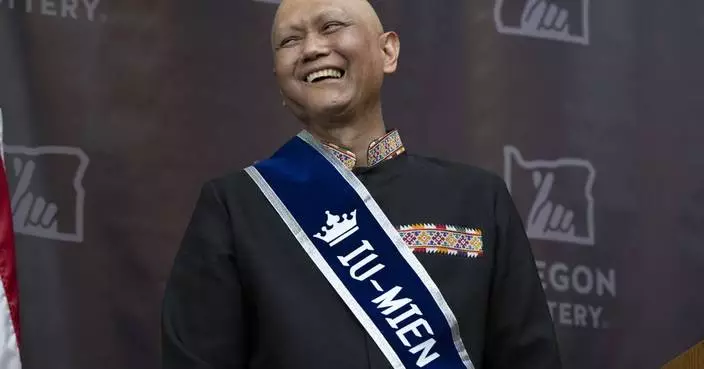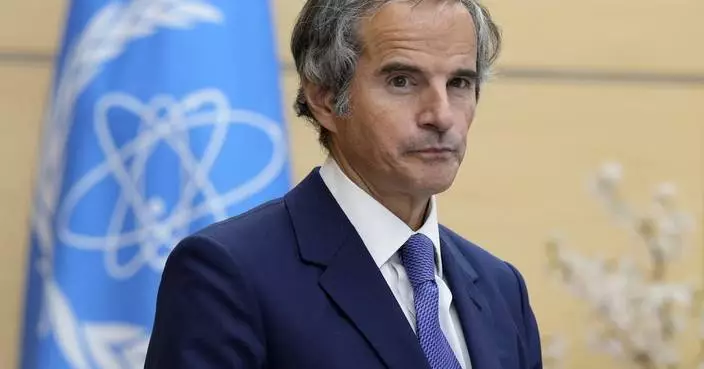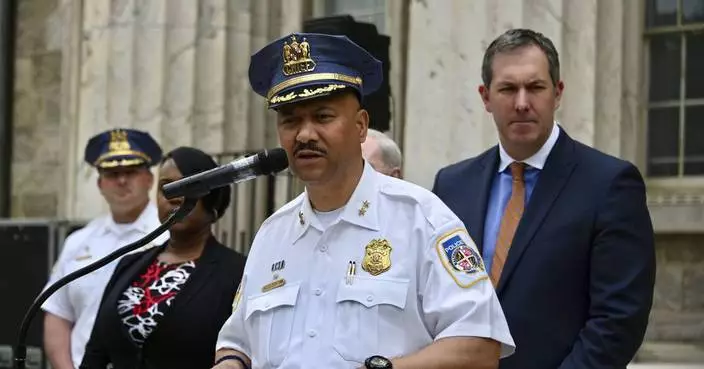Justin never thought he would be celebrating losing a testicle – until his friends and family came up with an idea to help keep his spirits up.
A former advertising high-flyer who had a “ball voyage” bash for his left testicle, following a cancer diagnosis, told how his ordeal became the springboard he needed into a fabulous new life.
Justin Robertson, 26, had moved from his seaside hometown of Bournemouth, Dorset, to the posh south west London suburb of Wimbledon and was living life in the fast lane, when he noticed his left testicle felt enlarged – but found excuses not to see a doctor.
Busy burning the candle at both ends, Justin, who does not wish to name his girlfriend, was finally forced to confront his fears at a walk-in health clinic, where he alerted doctors, leading to tests which revealed a cancerous lump.
He said: “One minute I was walking into a routine health check-up and the next I was being told I was losing a testicle.”
Knowing his positive outlook and sunny sense of humour, Justin’s friends and family were keen to make sure his ordeal did not change him.
Determined to keep his spirits up, in November 2016, just days before his operation, they organised a special surprise send-off for his testicle.
Justin laughed: “I couldn’t believe it when I stepped through the door and all my friends and family were shouting, ‘ball-voyage,’ in honour of my soon-to-be-departed left testicle.”
Not only were there spherical snacks, like meatballs and stuffing, there was also a selection of meat with one veg, and a variety of nuts in varying shapes.
And the playlist included Jerry Lee Lewis’ famous Great Balls of Fire and Miley Cyrus’ Wrecking Ball.
“It was such a great do and it made such a difference seeing everybody who’s important to me before the big op,” said Justin. “I was the butt of one too many ball-related jokes, but it was ace all the same.”
Just two days after the soiree, Justin was in theatre at St George’s Hospital in Tooting, south west London, having an orchidectomy procedure to remove a testicle through an incision made in the groin.
Fortunately, the surgery was a success, with Justin being discharged on the same day.
With follow-up treatment involving two bouts of chemotherapy and a course of radiotherapy, six months later, in May 2017 Justin was given the all clear.
Following the positive news, he underwent surgery to have a prosthetic testicle fitted, which he say brought him “closure.”
But, despite his good humour, Justin – who is speaking out as part of cancer charity Macmillan’s ‘Let’s Talk About What You Can’t Say’ campaign – says he believes a lot of what he went through could have been avoided if he had confronted his fears earlier .
“As fun as my ‘ball-voyage’ party was, you don’t want to have one thrown in your name – believe me,” he said.
“I wish I’d seen the doctor as soon as I noticed something was amiss, instead of waiting as long as I did.”
Recalling how he had first suspected something was wrong back in July 2016, he said he kept making excuses not to get it investigated.
“One morning I noticed that my left testicle felt slightly larger than before, it seemed irregular but there was no lump and I decided to see how it felt after a week,” he said.
But, caught up with his busy life in London, weeks turned to months, with Justin doing everything possible to put off visiting the doctor.
“Looking back, it’s clear that I could have made the time to see someone sooner if I’d wanted to – but I didn’t,” he explained.
“I was forever making excuses to myself. Either I had too much work on, or I didn’t want to eat into my social life, but deep down I know I was scared and embarrassed.”
Then, in November 2016, Justin finally plucked up the courage to see a doctor at a walk-in sexual health clinic about his enlarged left testicle and, after an initial examination, he was referred for an ultrasound scan later that day, after which doctors told him they suspected he had a cancerous tumour on his left testicle.
“I didn’t know how to react when they told me the news,” he said. “I knew it was a bit odd, being a bloke and getting an ultrasound, but I never could have imagined that it would be cancer.”
A week later, the cancer diagnosis was confirmed, with Justin being talked through the treatment.
He recalled telling his loved ones, saying: “Shane, my housemate, broke down in tears when I got home after the initial diagnosis.
“He knew lads who were just 16 when they were diagnosed with testicular cancer, which really grounded me, as at least I have broad shoulders to deal with the burden.”
And his sister Penny, 30, a civil servant, who he describes as “rational and logical” refused to let the diagnosis weigh the family down.
“Straight off the bat she was positive about the whole thing,” he explained. “She used to work for the department of health and insisted that this was something we were going to beat.”
Following successful treatment, Justin was given a brand new perspective on life, quitting his advertising job to put his talents to more positive use as senior marketing officer for the UK’s leading homeless charity, Crisis.
He said: “After coming through the other side of my cancer battle reasonably unscathed, I knew I wanted to do something meaningful and to give back.
“My work at Crisis is so fulfilling and I know what I do is making a difference to other people’s lives.”
It is for the same altruistic reasons that he is now telling his story, in support of the ‘Let’s Talk About What You Can’t Say’ campaign.
“I’m a well-educated guy, but as with so many other men my age, despite being fully aware that our bodies are susceptible to health issues, I shut out that voice of reason,” he confessed.
“That’s why I’m working with Macmillan on this campaign. Silence is a killer and too many men are staying silent.”
For more information on the ‘Let’s Talk About What You Can’t Say’ campaign, visit www.macmillan.org.uk/letstalk or call 0808 808 00 00
LONDON (AP) — Millions of voters in England cast ballots Thursday in an array of local elections, the last big test before a looming U.K. general election that all indicators suggest will see the Labour Party return to power after 14 years in the wilderness.
Prime Minister Rishi Sunak was barely able to point to any big success for his Conservative Party, confirming that the electoral coalition that gave the party a big win in the 2019 general election has frayed, if not completely dissolved, in the wake of a series of political dramas and the cost of living crisis.
For Labour leader Keir Starmer, the results provided confirmation of what opinion polls have shown for two years — that Labour has recovered from its 2019 low and is on course to win the election comfortably.
Here are five things we learned:
It's possible.
Though the Conservatives lost around half the 1,000 council seats they held, and suffered a huge defeat in the special parliamentary election in Blackpool South, a coastal resort town in the northwest of England, it looks as though Sunak will not face a revolt just yet from anxious lawmakers in his party.
That's largely because the Conservative candidate in the mayoral contest in Tees Valley in the northeast of England hung on, albeit with a much depressed vote. That helped soothe some concerns despite losses elsewhere.
However, the defeat of the Conservative incumbent mayor in the West Midlands could prompt another bout of jitters among lawmakers increasingly concerned about their ability to hold onto their seats in a general election. Sunak is under pressure from different wings of the party to go further right or move to the center.
Overall, the results show that Sunak hasn't improved the Conservatives’ overall position following the damage caused by the actions of his predecessors, Boris Johnson, who was effectively ousted, and then replaced by Liz Truss, whose tenure lasted only 49 days after her economic policies rocked financial markets.
Probably in the fall.
In the U.K., the date of the general election rests in the hands of the prime minister. It has to take place by January, and Sunak has repeatedly said that his “working assumption” was that it would take place in the second half of 2024.
Though that theoretically could take place as soon as July, most Conservative lawmakers have indicated that the best time would be in the fall, when recent tax cuts may register with voters, inflation has fallen further, and interest rates may have been cut — helping to fuel an economic feelgood factor.
Waiting till the fall may also give the government a chance to cut taxes again in another budget. Conservatives will also be hoping that the controversial plan to send some asylum-seekers to Rwanda will have got off the ground and that there is evidence that it is acting as a deterrent for those seeking to make the dangerous crossing in small boats across the English Channel from France to England.
It looks like it.
In historical terms, Labour has a mountain to climb, if it’s going to form the next government. Its performance at the last general election in 2019 was its worst since 1935. Starmer has tried to bring the party back to the center of U.K. politics after the leadership of veteran left-winger Jeremy Corbyn.
Starmer’s approach has clearly worked if Thursday's results are anything to go by. Labour won control of councils in England that the party hasn’t held for decades, and was successful on a massive swing away from the Conservatives in Blackpool South, which if repeated at the general election would lead to a big majority.
Labour won in areas that voted for Britain’s departure from the European Union in 2016 and where it was crushed by Brexit-backer Johnson, such as Hartlepool in the northeast of England, and Thurrock in southeast England. It also seized control of Rushmoor, a leafy and military-heavy council in the south of England where it had never won, showing that it has a broad base of support.
It’s fair to say that enthusiasm levels are far lower than those that heralded the arrival of Labour's Tony Blair before the 1997 general election.
That may be partly because of the more challenging economic backdrop, but Starmer, formerly a human rights lawyer, lacks the razzmatazz of Blair.
It'll be tough.
One of the contributing factors to Blair’s landslide victory in 1997 came from so-called tactical voting, whereby some voters put aside their political preference and vote for whoever has the best chance of defeating the party they oppose the most. In 1997, that was the Conservatives.
Tactical voting has reemerged and was evident somewhat in Thursday's elections where Conservative candidates lost out to other parties, not just Labour, but also to the centrist Liberal Democrats and also to the Green Party.
The Conservatives may also be outflanked from the right, with Reform U.K. poised to stand candidates across Britain. In Thursday's elections, it was a minimal presence but where the party did stand, it clearly took votes away from Conservative candidates. That was notable in Blackpool South, where the Reform candidate was just shy of usurping the Conservatives into second.
Should Reform, which claims to be tougher on issues such as immigration and on Brexit, do as well in a general election, then it could lead to other parties, notably Labour, defeating Conservatives.
It certainly looks like it.
In some areas with large Muslim populations, such as Blackburn and Oldham in northwest England, Labour candidates appear to have suffered as a result of the leadership’s strongly pro-Israel stance over the conflict in Gaza.
Labour's vote share was clearly impacted, but the effect on its performance in a general election remains unclear, as those seats with a big Muslim population generally have big Labour majorities.

London Mayoral Labour Party candidate Sadiq Khan pats his dog Luna as they pose for the media he arrives to vote in London, Thursday, May 2, 2024. Khan, is seeking re-election, and standing against 12 other candidates for the post of Mayor of London. There are other Mayoral elections in English cities and as well as local council elections. (AP Photo/Kin Cheung)
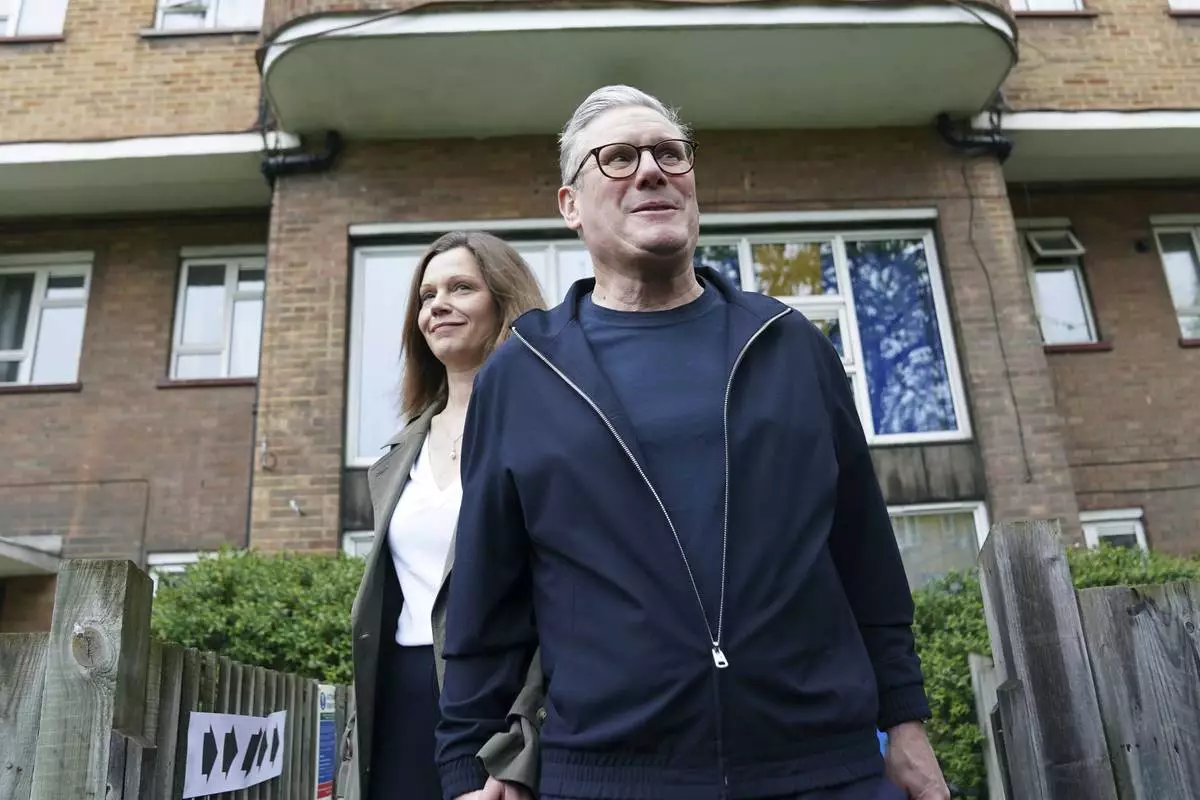
Britain's Labour leader Keir Starmer and his wife Victoria leave the polling station in his Holborn and St Pancras constituency, after casting their votes in the local and London Mayoral election, in north London, Thursday May 2, 2024. (Stefan Rousseau/PA via AP)

Counting begins at the Blackpool South by-election at Blackpool Sports Centre in Blackpool, England, Thursday, May 2, 2024. The by-election was triggered after the resignation of Scott Benton. (Peter Byrne/PA via AP)
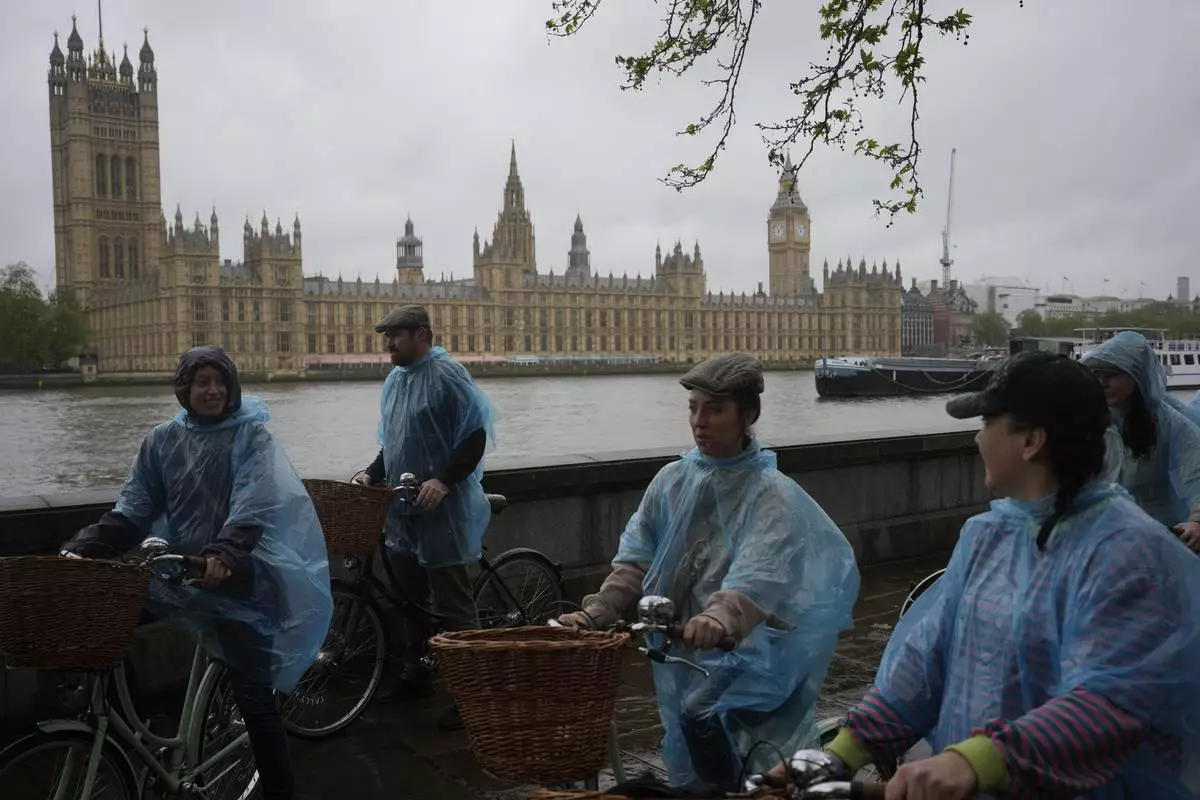
Tourists on a cycle tour in wet weather plastic macs, cycle past the Houses of Parliament, in London Friday, May 3, 2024. Britain's governing Conservative Party is suffering heavy losses as local election results pour in Friday, piling pressure on Prime Minister Rishi Sunak ahead of a U.K. general election in which the main opposition Labour Party appears increasingly likely to return to power after 14 years. (AP Photo/Kin Cheung)
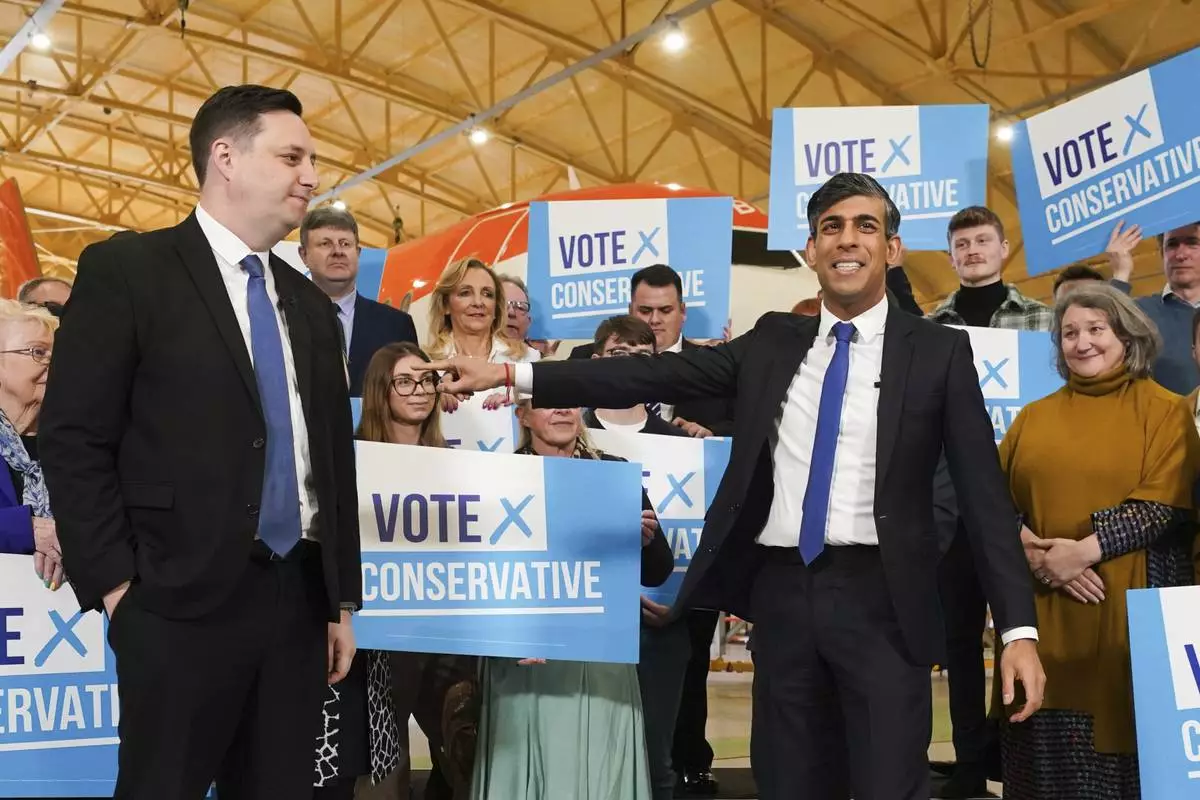
Conservative party candidate Lord Ben Houchen, left, with Britain's Prime Minister Rishi Sunak following his re-election as Tees Valley Mayor in Teesside, England, Friday May 3, 2024. (Owen Humphreys/PA via AP)
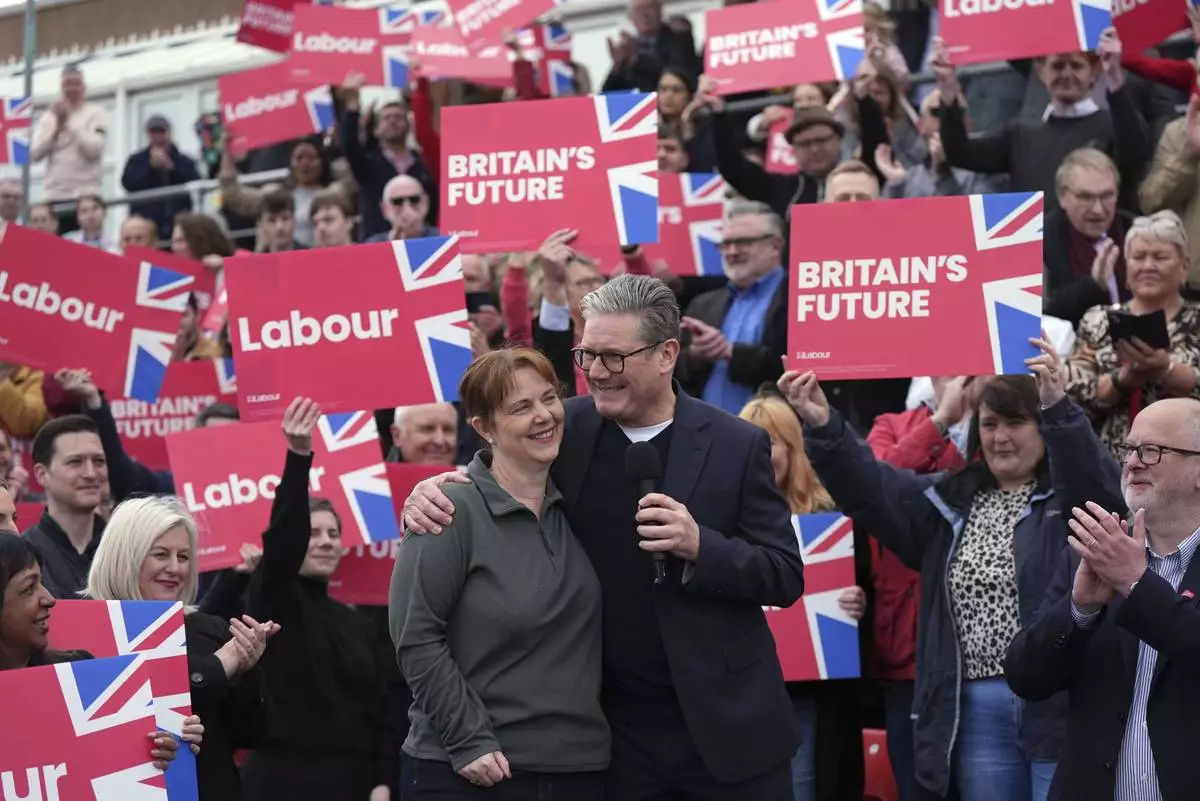
Britain's Labour Party leader Sir Keir Starmer with newly elected East Midlands mayor Claire Ward during a visit to Forest Town Arena in Mansfield, England, Saturday May 4, 2024. (Jacob King/PA via AP)
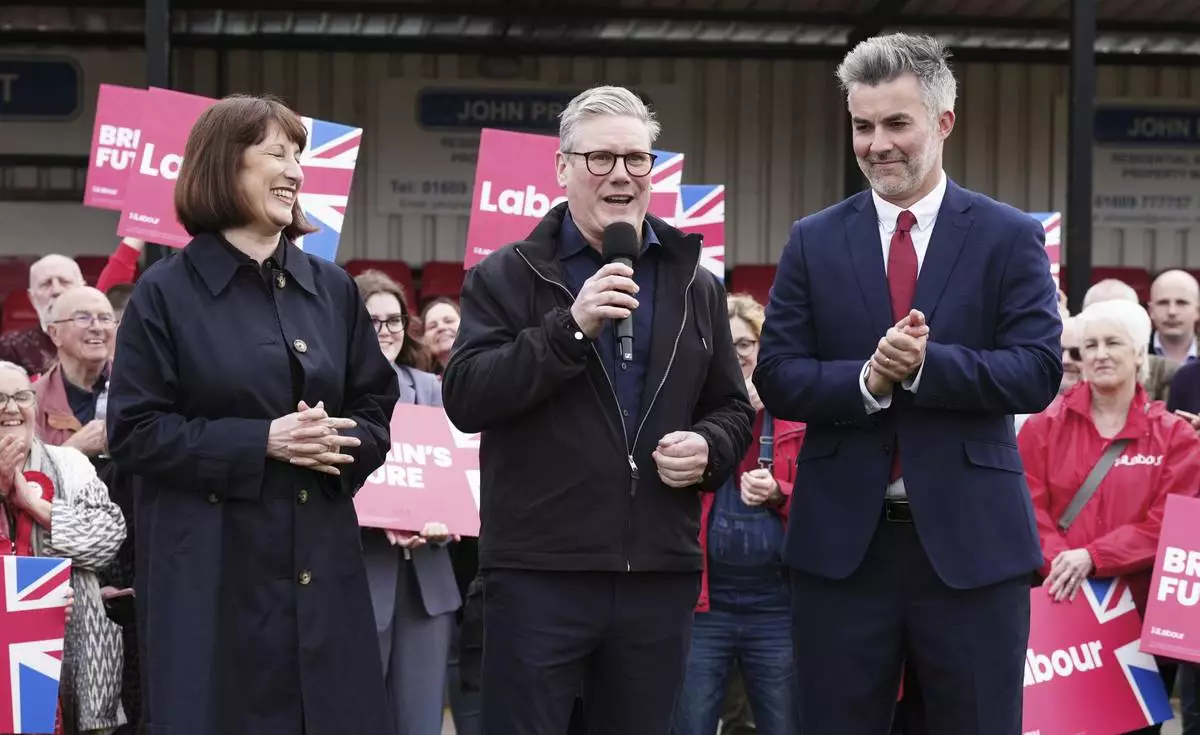
Britain's Labour Party leader Sir Keir Starmer, center, and shadow chancellor Rachel Reeves, celebrate with David Skaith at Northallerton Town Football Club, North Yorkshire, after winning the York and North Yorkshire mayoral election, Friday May 3, 2024. (Owen Humphreys/PA via AP)










